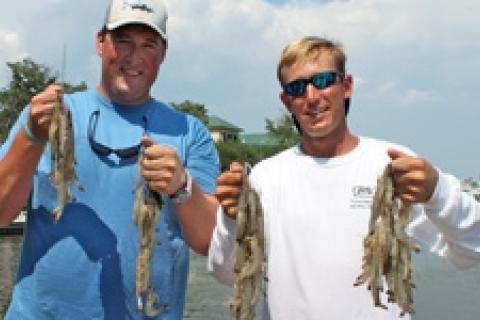
 Each fall there is a two-month window for recreational shrimpers to use bait to gather these tasty crustaceans for sport. The South Carolina Department of Natural Resources set this year's shrimp baiting season from Sept. 13 through Nov. 12.
Each fall there is a two-month window for recreational shrimpers to use bait to gather these tasty crustaceans for sport. The South Carolina Department of Natural Resources set this year's shrimp baiting season from Sept. 13 through Nov. 12.
South Carolina residents can purchase the special shrimp baiting license for $25, giving them an area of 100 linear yards to set up 10 long PVC pipes. The poles will be planted in a line to establish the baiting grounds, and each pole will mark exactly where the fishmeal bait has been deployed. Shrimpers then make pass after pass in their boat down the poles casting nets over the sweet spot.
Each day recreational shrimpers are allowed a legal harvest of one 48-quart cooler of heads-on shrimp. If heading the shrimp during harvest, the legal limit is 29 quarts of headed shrimp. This creates the perfect opportunity to eat fresh seafood but also to gather local shrimp and freeze them to eat later in the year.
After choosing a crew of shrimping friends to help with chores like making bait balls, running the boat and holding a light after dark, the most important equipment is your cast net. A Betts Super Pro cast net carries 1.5-ounces of lead per foot, which aids the net to get down quickly on top of the shrimp before they dart away.
Timing plays a role since the bait balls begin to disintegrate in the current once deployed. The shrimp tend to gather, or run, right around dusk in shallow areas along the spartina marsh. Setting up the poles and bait may take an hour or less, but the bait balls won't last more than two hours. On a good night, a legal limit can be caught during that time, but then an hour of heading shrimp and clean up follows.
It may be easier for most to stop by the supermarket in order to pick up a shrimp dinner, but for others shrimp-baiting season provides many intangibles. Time spent on the water enjoying the cooler temps of fall weather while casting nets for a sustainable harvest reminds sportsmen about the heritage of coastal living.
The forecast for the bait shrimping season is very good since the mild winter helped shrimp to overwinter. The ample rainfall of summer has slowed in September which should increase water salinity in inlets, harbors and sounds. New this year the SCDNR asks recreational shrimpers to report any catches of Asian tiger shrimp, allowing shrimp-baiters to play a positive role in monitoring the natural resources for the presence of this invasive species.
- 6965 views

